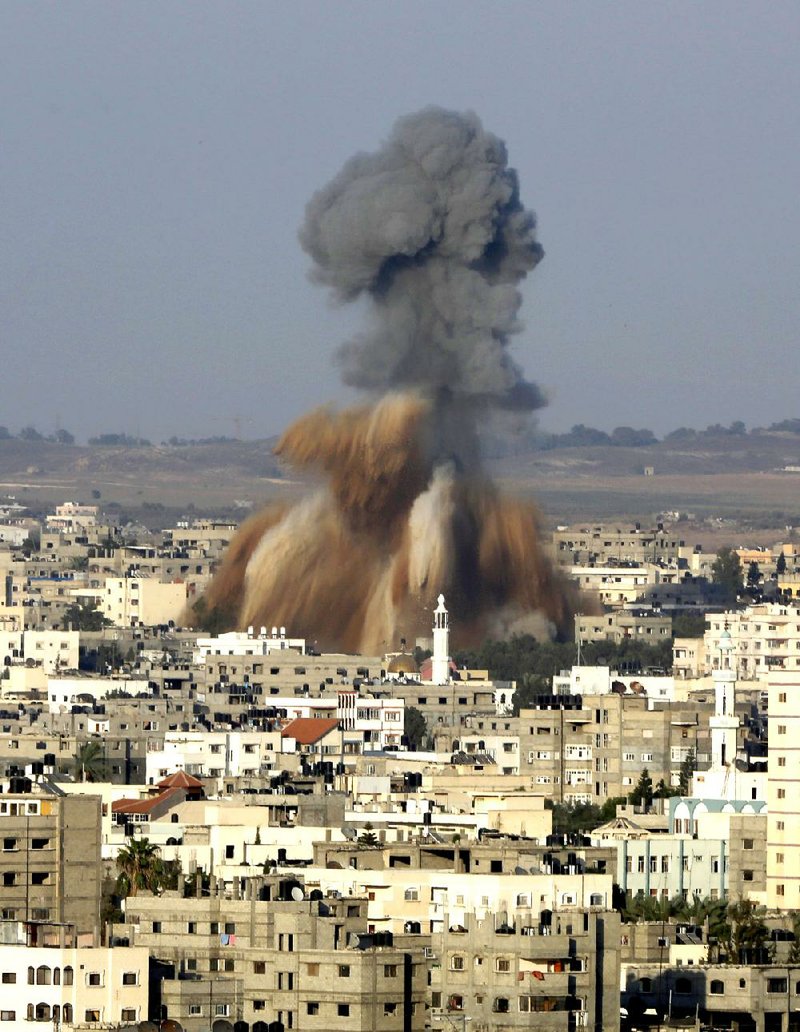CAIRO — Egyptian attempts to broker an end to a month-long war between Israel and Hamas militants collapsed Tuesday, with Palestinian militants firing dozens of rockets and Israel responding with airstrikes across the Gaza Strip. At least three Palestinians were killed.
Israel walked out on the talks just hours before a midnight deadline after fighting picked up late Tuesday. The Israeli military said 10 rockets had fallen, including one that damaged a coffee shop in southern Israel.
Palestinian officials in Gaza reported more than two dozen Israeli airstrikes. At least 21 people were wounded in a strike that hit a building housing the offices of Hamas’ Al Aqsa TV station in Gaza City, said Palestinian medical official Ashraf al-Kidra.
At least three people, including two women and a 2-year-old girl, were killed in a separate airstrike, he said. They were the first fatalities in the renewed fighting, which continued into the night.
“The Cairo talks were based on an agreed premise of a total cessation of hostilities,” Israeli government spokesman Mark Regev said. “When Hamas breaks the cease-fire, they also break the premise for the Cairo talks. Accordingly, the Israeli team has been called back as a result of today’s rocket fire.”
He would not say whether the team would return to Cairo nor whether Israel would resume cease-fire talks. Egyptian security officials said Egypt was still pressing the two sides to agree on a cease-fire.
The breakdown dealt a tough blow to nearly a week of Egyptian-led diplomacy meant to end the heaviest fighting between Israel and Hamas since the Islamic militant group seized control of Gaza in 2007.
More than 2,000 Palestinians, most of them civilians, have been killed in the fighting, according to Palestinian and United Nations officials, and tens of thousands are homeless. Israel has claimed many of those killed were militants, and it blames Hamas for causing civilian casualties by staging attacks from residential areas.
Sixty-four Israeli soldiers, two Israeli civilians and a guest worker also have been killed.
Hamas is seeking an end to a seven-year Israeli-Egyptian blockade that has ravaged Gaza’s economy, while Israel wants guarantees that Hamas will disarm.
In nearly a week of indirect talks, Egypt appears to have made little headway in resolving the differences. Late Monday, it secured a 24-hour extension to a temporary truce to allow more time for a last-ditch attempt to reach a longer-term deal.
An Egyptian compromise proposal calls for easing the blockade but not lifting it altogether or opening the territory’s air and sea ports as Hamas has demanded.
While the plan does not require Hamas to give up its weapons, it would give Western-backed President Mahmoud Abbas, whose forces were ousted by Hamas in 2007, a foothold in Gaza, running border crossings and overseeing internationally backed reconstruction. Abbas’ presence would minimize friction with Israel and allow international aid to flow into Gaza for reconstruction.
In Cairo, members of the Palestinian delegation, which is composed of various factions, said no progress had been made in Tuesday’s talks. Azzam al-Ahmad, leader of the Palestinian delegation, blamed Israel for the failure but held out hope that the talks could be resumed.
“We told the Egyptians we are ready to return to the talks once they find the proper atmosphere,” he said, adding that the Palestinians had submitted a final cease-fire proposal.
“It’s clear the Israelis are not interested in the cease-fire. We did not hear from them. We were willing to, but we did not hear from them,” he said.
Hamas finds itself pressured by both Egypt and the Palestinian Authority to accept a less-than-perfect deal with Israel but needs to show the people of Gaza that the sacrifices they endured in the fighting were not in vain.
The disagreements have focused on the lifting of the blockade.
A member of the Palestinian delegation said Israel was offering to ease the blockade by opening border crossings to some goods and people but was insisting that it retain the right to limit the imports of material such as cement and chemical and metal products, which Israel says can be used for weapons manufacturing.
Hamas fears the arrangement would allow Israel to retain the right to close the crossings again and is pushing for more Palestinian input into such decisions.
The Palestinians are also seeking assurances that Israel will discuss the reopening of the seaport and airport and the release of Palestinian prisoners held in Israeli jails, a month after a formal cease-fire takes hold. The Israelis want at least three months of quiet, Palestinians say.
Information for this article was contributed by Maggie Michael and Ibrahim Barzak of The Associated Press.

